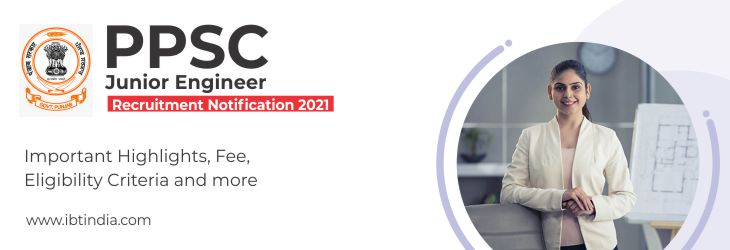PPSC Junior Engineer Recruitment 2021: Important Dates, Syllabus, Pattern, Eligibility Criteria, Fee, Vacancy, Online Application and Salary Details
Punjab Public Service Commission has issued an official notification for recruitment of 612 Junior engineers. Eligible and interested candidates can apply for it online upto 19th May 2021. All the candidates who are interested in the post must stay updated and apply before the last date arrives. Let us discuss important dates, syllabus, pattern, eligibility criteria, fee, vacancy, online application and salary details of the PPSC Junior Engineer Recruitment 2021.
PPSC Junior Engineer Vacancy Details
There are a total of 612 posts for junior engineer in two different departments as stated below:
|
Post |
Vacancies |
|
Junior Engineers (Civil) in the Department of Water Resource, Punjab. |
585 |
|
Junior Engineers (Civil) in Water Resources Management and Development Corporation, Punjab. |
27 |
PPSC Junior Engineer Important Dates
Important dates regarding online application and payment of fee are mentioned hereunder:
|
Events |
Dates |
|
Start date of Online Application |
6th March 2021 |
|
Last date of Online Application |
19th May 2021 |
|
Last date for payment of fee |
26th May 2021 |
|
Exam Date |
15th June 2021 |
PPSC Junior Engineer Eligibility Criteria (Age & Qualification)
Age Limit:
Candidates should not be below 18 years and above 37 years of age as on 01.01.2021. Relaxation of upper age limit is given to various categories as per the Punjab government rules.
Educational Qualification:
Candidates must have the following education qualification to appear for the PPSC Junior Engineer exam:
-
Should possess three years Diploma of Junior Engineer in Civil Engineering from a State Technical Education Board or from recognized University or Institution.
-
The candidate possessing higher qualification in terms of degree/Masters in engineering is also eligible, provided he/she mandatory possess basic qualification in terms of diploma in Civil Engineering.
-
Punjabi of Matric or its equivalent Standard.
PPSC Junior Engineer Exam Pattern
The pattern for written exam comprising of 120 questions (@ 2.5 marks for each question and Time allotted ( 2 Hours) would be as below:
|
Section |
No. of questions |
Maximum marks |
|
Questions from the Subjects (Stated above) |
100 |
250 marks |
|
Questions from Logical Reasoning, Mental ability and General Knowledge |
20 |
50 marks |
PPSC Junior Engineer Exam Syllabus
Detailed exam syllabus is mentioned below:
|
Subject |
Syllabus |
|
Engineering Drawing |
Lettering Technique and Practice, Dimensioning Techniques (Necessity of dimensioning, method and principles of dimensioning etc.), Scales (need and importance of scales, Drawing of plain and diagonal scales etc.), Projections, Sections, Symbols and Conventions. |
|
Applied Mechanics |
Introduction, Laws of forces, Moment, Friction, Centre of Gravity etc. |
|
Fluid Mechanics |
Introduction, Properties of Fluids, Hydrostatic Pressure, Measurement of Pressure, Fundamentals of Fluid Flow (Types of Flow, Discharge, hydraulic energy, Bernoulli's theorem etc.), Flow Measurements (brief description with simple numerical problems, Venturimeter, Pitot tube, Orifice, Current meters, Notches etc.), Flow through Pipes (Definition of pipe flow; Reynolds number, laminar and turbulent flow, Critical velocity and velocity distributions in a pipe for laminar flow, Head loss in pipe lines, Hydraulic gradient line and total energy line, Pipes in series and parallel, Water hammer phenomenon etc.), Flow through open channels (uniform and non-uniform flow, discharge through channels using Chezy’s formula and Manning’s formula,Most economical sections, rectangular, trapezoidal and circular etc.), Hydraulic Pumps and motors (types, uses and efficiency etc.) |
|
Surveying |
Basic principles of surveying, Concept and purpose, Instruments used for taking these measurements etc., Chain surveying, Compass surveying, Levelling, Plane Table Surveying, Total Station Method, Auto Level, Contouring, Theodolite Surveying, Tacho-metric surveying, Curves, Digital Survey, Introduction to the use of Modern Surveying equipment and techniques, Total Stations etc. |
|
Construction Materials & Building Construction |
General characteristics of stones, Requirements of good building stones, Identification of common building stones, Bricks and Tiles, Cement (Various types of Cements, Properties of cement etc.), Lime, Timber and Wood-Based Products, Paints and Varnishes, Miscellaneous Materials etc., Introduction to Building Construction, Foundation, Walls, Masonry, Arches and Lintels, Doors, Windows and Ventilators, Damp Proofing and WaterProofing, Floors, Roofs, Stairs, Anti Termite Measures, Building Planning etc. |
|
Structural Engineering |
Simple stresses and strains, Elasticity, Hooke’s Law, Moduli of Elasticity and Rigidity. Stresses and strains of homogeneous materials and composite sections. Types of beams and supports and loads, Concept of bending moment and shear force. Bending moment and shear force diagrams for simple cases. Deflection in beams. Moment area theorem, Bending and shear stresses in circular, rectangular, T and L sections etc. |
|
Earthquake Resistant Building Construction |
Elements of Engineering Seismology, Performance of building during earthquakes and Mode of failure, Special construction method, tips and precautions to be observed while planning, designing and construction of earthquake resistant building, Introduction to IS: 4326, IS: 13828, IS: 1893(Part 1), 154326 and IS: 13920 (latest edition), Seismic Provision of Strengthening and Retrofitting Measures for Traditionally- Built Constructions, Brick and RCC Structures, Provision of reinforcement detailing in masonry and RC constructions |
|
Water Supply and Waste Water Engineering |
Water requirement, Rate of demand and supply, Per capita consumption, Population Forecasting etc., Physical, Chemical and bacteriological properties, Standard of potable water as per Indian Standard etc., Water Treatment including Sedimentation, Coagulation, flocculation etc. Definition of terms in sanitary engineering, Surface drains, Types of sewage, Sewerage, Laying and Construction of Sewers, Sewage characteristics (Properties of sewage as per IS standards), Natural Methods of Sewage Disposal, Sewage Treatment, BOD, COD, Building Drainage (Different sanitary fittings and installations, Traps, seals, Testing of house drainage etc.) |
|
Soil and Foundation Engineering |
Physical properties of soil, Classification and identification of soils, permeability and its importance, effective stress, Strength Characteristics of Soils, Compaction, Bearing Capacity of soil, Concept of shallow and deep foundation; types of shallow foundations and their suitability. Factors affecting the depth of shallow foundations, deep foundations, type of piles and their suitability; pile classification on the basis of material, pile group and pile cap etc. |
|
Transportation Engineering |
Introduction of Transportation Engineering, Traffic Engineering, Road materials, Geometric design, Design of flexible and rigid pavements, Road Maintenance, Railway Engineering Rails, Sleepers, ballast, points and crossing, Track laying and track maintenance. |
|
Irrigation Engineering |
Introduction to irrigation, methods of irrigation, tube well irrigation, tank irrigation, sprinkler irrigation, drip irrigation, water logging, design of irrigation canals and irrigation outlets. |
|
Environmental Engineering |
Importance of Environmental Engineering, Water Pollution (Causes lakes and its preventing measure, BIS standards for water quality etc.), Air Pollution, Noise Pollution, Effects of mining, blasting and deforestation, Land Use (land use and natural disasters, landslides etc.) soil degradation problems - erosion, water logging, soil pollution etc.) |
|
Quantity Surveying and Valuation |
Introduction to quantity surveying and its importance, duties of quantity surveyor, types of estimates, measurement, preparation of detailed and abstract, estimates from drawings, calculation of quantities of materials, analysis of rates, contractorship, preparation of tender document based on Common Schedule of Rates (CSR). |
|
Repair and Maintenance of Buildings |
Need for maintenance, agencies causing Page 14 of 18 deterioration (sources, causes, effects), investigation and diagnosis of defects, defects and their root causes, materials for repair, maintenance and protection, remedial measures for building defects, surface preparation techniques for repair, crack repair methods, repair of surface defects of concrete, repair of corrosion in RCC elements, repair of DPC against rising dampness, repair of walls, waterproofing of wet areas and roofs, repair of joints in buildings etc. |
|
Construction Management and Accounts |
Construction Planning, CPM, PERT, site organization, Construction Labour (Labour Welfare Fund Act 1936 (as amended), Payment of Wages Act 1936 (as amended), Minimum Wages Act 1948 (as amended), control of progress, inspection and quality control, accidents and safety in construction, accounts, public work accounts, request for quotation, bill of quantities, measurement book, indent book, material at site register. |
|
Basics of Management |
Introduction, Leadership, Motivation, Ethics and Values, Team related skills- sympathy, empathy, co-operation, concern, lead and negotiate, work well with people from culturally diverse background, Communication in group - conversation and listening skills, Task Initiation, Task Planning, Task execution, Task close out, Customer Relationship Management (CRM), Need, various types of customers, customer satisfaction, life- long customer, Customer Satisfaction Index (CSI) and its significance, Elementary knowledge of Income Tax, Sales Tax, Excise Duty, Provident Fund, Employees State Insurance Act, Labour welfare schemes, Labour laws, worker and public safety techniques, systems of wage payment, incentives, Factory Act 1948 with special reference to health, safety and welfare measures, working hours, annual leave with wages, Payment of Wages Act1936, Minimum Wages Act 1948, safeguards in construction practices, Introduction to Total Quality Management (TQM), Community Participation in Water Supply and Sanitation, Roll of Women in Water Supply and Sanitation etc. |
PPSC Junior Engineer Exam Fee
Application and examination fee for different categories is stated below:
|
Category |
Fee |
|
For SC/ST of All States & BC of Punjab |
Rs. 1125/- (Application Fee+Exam Fee) |
|
For Ex-Servicemen of Punjab state only |
Rs. 500/- (only Application Fee) |
|
For PWD of Punjab state only |
Rs. 1750/- (Application Fee+Exam Fee) |
|
For other Candidates |
Rs. 3000/- (Application Fee+Exam Fee) |
|
Payment Mode |
through any Branch of State Bank of India only |
PPSC Junior Engineer Salary Details
Selected candidates will be entitled to an initial pay scale of Rs 35,400 as per latest law and rules set by the government of Punjab.
How to apply for this exam?
Interested candidates can apply for this exam from the official website of PPSC before 19th May 2021. Candidates are required to register themselve online and print their admit cards with the help of registration number and password.
PPSC Junior Engineer Exam Summary
|
PPSC Junior Engineer Exam Summary 2021 |
|
|
Conducting Head |
Punjab Public Service Commission (PPSC) |
|
Full form of PPSC |
Punjab Public Service Commission |
|
Exam Type |
State Level Exam (Punjab Government job) |
|
Official Website |
http://ppsc.gov.in |
|
Exam Dates |
15th June 2021 |
|
Last date of Online Application |
19th May 2021 |
|
Mode of Application |
Online on the official website |
|
Total Vacancies |
612 |
|
Salary Details |
Selected candidates will be entitled to initial pay of Rs 35,400 |

 9696960029
9696960029 Download App's
Download App's


